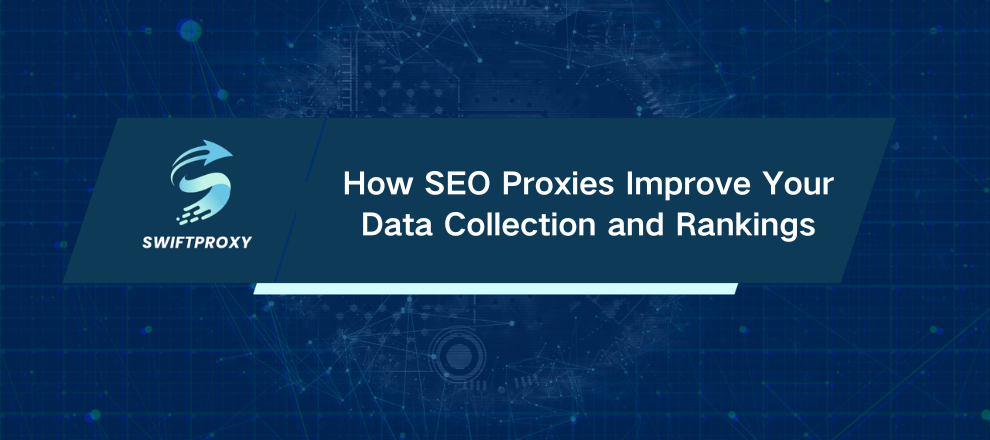How SEO Proxies Improve Your Data Collection and Rankings
Data is the key of SEO. Without it, you’re flying blind. Every keyword you track, every competitor you analyze, every localized campaign you run hinges on accurate, unrestricted access to search engine results. The problem is that if you hit Google too often from the same IP, you risk being blocked almost immediately. That’s where SEO proxies come in.

How SEO Proxies Actually Work
When you scrape search engine results or track keyword rankings, you're sending thousands of requests to platforms like Google. Search engines are smart. They can detect unusual activity and will throttle or block your IP if you send too many queries too quickly. Proxies act as the middleman. Your request first hits the proxy server. The proxy then forwards it to the target website. The site responds to the proxy, which sends the data back to you. The result? Google never sees your real IP. Instead, it sees the proxy's, keeping your scraping activity under the radar.
Why You Can't Do SEO Without Proxies
SEO today is data-driven. Your content strategy, ad spend, and optimization tactics depend on reliable intelligence. Without proxies, data collection hits roadblocks almost immediately. Here's why proxies are essential:
Scrape SERPs at Scale
Staying ahead of competitors means knowing exactly where your pages rank, how search results evolve, and what rivals are doing. Proxies let you:
Gather SERP insights without getting blocked.
Analyze competitor rankings, featured snippets, ad placements, and content strategies.
Track thousands of keywords across multiple locations in real-time.
Without proxies, your IP could get throttled, blocked, or flagged, leaving you with incomplete or unreliable data.
Geo-Targeted Search Results
Search engines show personalized results based on location. To know what a customer in Berlin sees when searching “best running shoes,” a New York IP won't cut it. Proxies let you:
Track keyword performance locally.
Audit international campaigns accurately.
Tailor content based on the actual regional SERPs.
This geographic precision is vital for any global SEO effort.
Avoid IP Bans and Rate Limits
Search engines cap the number of requests per IP. Go beyond that, and you face temporary blocks, CAPTCHAs, or skewed data. Proxies distribute requests across multiple IPs, making your activity look natural. The result: smoother data collection and more reliable insights.
Automate SEO at Scale
Automated tools—whether tracking keywords or monitoring visibility—send thousands of requests. One IP won't survive. Rotating or residential proxies keep these tools running seamlessly, bypassing restrictions and minimizing disruptions. Essentially, proxies are the infrastructure that makes SEO scalable.
How to Pick the Right SEO Proxy Provider
Not all proxies are equal. Picking the wrong provider can slow campaigns or jeopardize data integrity. Key considerations:
Speed and Performance: Slow proxies create bottlenecks. Look for high-speed connections, low latency, and infrastructure optimized for large volumes.
Success Rate and Stability: You need proxies that consistently access search engines without being blocked. High success rates and reliable IPs are non-negotiable.
IP Rotation and Session Management: Rotating proxies avoid detection. Sticky sessions maintain a single IP when needed—perfect for scraping paginated SERPs or logged-in sessions.
IP Pool Capacity and Diversity: Millions of IPs across countries and cities mean fewer blocks and more flexibility for geo-targeted campaigns.
Help and Documentation: 24/7 technical support, real-time dashboards, and clear guides keep you moving even when something goes wrong.
SEO Tools That Gain from Proxies
Proxies are the silent engine behind modern SEO tools. They supercharge efficiency and keep you invisible to Google. Examples include:
Rank Trackers: Tools like SEMrush and Ahrefs rely on proxies to pull geo-targeted rankings at scale without triggering CAPTCHAs.
SERP Scrapers: Collecting snippets, ads, and local packs in real-time requires proxies.
Keyword Research Platforms: Bulk keyword discovery from multiple locations without being flagged.
On-Page and Technical SEO Tools: Crawling competitor websites or auditing client sites from different regions.
Local and Mobile SEO Testing: Mobile proxies simulate real user behavior in specific cities or ZIP codes, providing accurate search insights.
Final Thoughts
SEO proxies aren't optional—they're strategic. They unlock the data you need, protect your IPs, and power automation at scale. If you want to make informed decisions, outrank competitors, and execute geo-targeted campaigns, integrating high-quality proxies isn't just smart—it's crucial.

















































